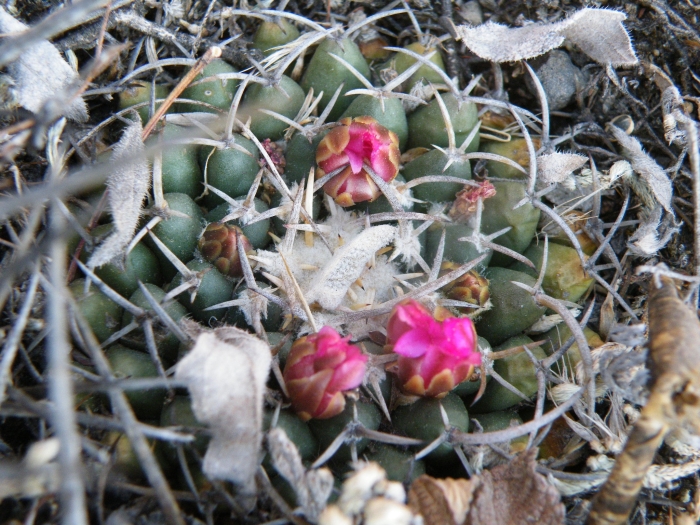Mexican Pincushion
(Mammillaria magnimamma)
Mexican Pincushion (Mammillaria magnimamma)
/
/

Amante Darmanin
CC BY 2.0
Image By:
Amante Darmanin
Recorded By:
Copyright:
CC BY 2.0
Copyright Notice:
Photo by: Amante Darmanin | License Type: CC BY 2.0 | License URL: https://creativecommons.org/licenses/by/2.0/ | Uploader: amantedar | Publisher: Flickr |





















Estimated Native Range
Summary
Mammillaria magnimamma, commonly known as Mexican Pincushion, is an evergreen succulent native to arid and semi-arid regions of Central and Northeast Mexico, where it thrives in rocky outcrops and slopes. This perennial plant typically reaches a height of 15–30 cm and a diameter of about 13 cm. Initially solitary, it eventually forms large clumps that may rise above ground level. The Mexican Pincushion is characterized by its cylindrical shape with tubercles and axillary wool. Flowers are pink or white cream with reddish midveins, measuring 20–25 mm in diameter, and bloom in mid-spring, offering a modest yet attractive display.
This succulent is valued for its ease of maintenance, drought tolerance, and the ornamental quality of its flowers and form. It is often used in rock gardens, as a container plant, or in xeriscaping. Mexican Pincushion prefers full sun and requires a well-drained medium, ideally a cactus mix, to prevent root rot. It is cold hardy down to 1 °C (34 °F), but must be protected from frost and inclement weather, making it suitable for outdoor cultivation in temperate zones during the summer. Overwatering and poor drainage are common issues that can lead to disease. It has earned the Royal Horticultural Society’s Award of Garden Merit, indicating its exceptional qualities for garden use.CC BY-SA 4.0
This succulent is valued for its ease of maintenance, drought tolerance, and the ornamental quality of its flowers and form. It is often used in rock gardens, as a container plant, or in xeriscaping. Mexican Pincushion prefers full sun and requires a well-drained medium, ideally a cactus mix, to prevent root rot. It is cold hardy down to 1 °C (34 °F), but must be protected from frost and inclement weather, making it suitable for outdoor cultivation in temperate zones during the summer. Overwatering and poor drainage are common issues that can lead to disease. It has earned the Royal Horticultural Society’s Award of Garden Merit, indicating its exceptional qualities for garden use.CC BY-SA 4.0
Plant Description
- Plant Type: Succulent
- Height: 0.3-1 feet
- Width: 0.3-1 feet
- Growth Rate: Slow
- Flower Color: Brown, Cream, Pink
- Flowering Season: Winter, Spring
- Leaf Retention: Evergreen
Growth Requirements
- Sun: Full Sun, Part Shade
- Water: Very Low
- Drainage: Fast
Common Uses
Bee Garden, Drought Tolerant, Low Maintenance, Potted Plant, Rabbit Resistant, Rock Garden
Natural Habitat
Arid and semi-arid regions of Central and Northeast Mexico
Other Names
Common Names: Vårtkaktus
Scientific Names: , Mammillaria magnimamma, Mammillaria krameri, Mammillaria schiedeana, Mammillaria bucareliensis, Mammillaria vagaspina, Mammillaria saxicola, Mammillaria centricirrha, Mammillaria macracantha, Mammillaria zuccariniana
GBIF Accepted Name: Mammillaria magnimamma Haw.